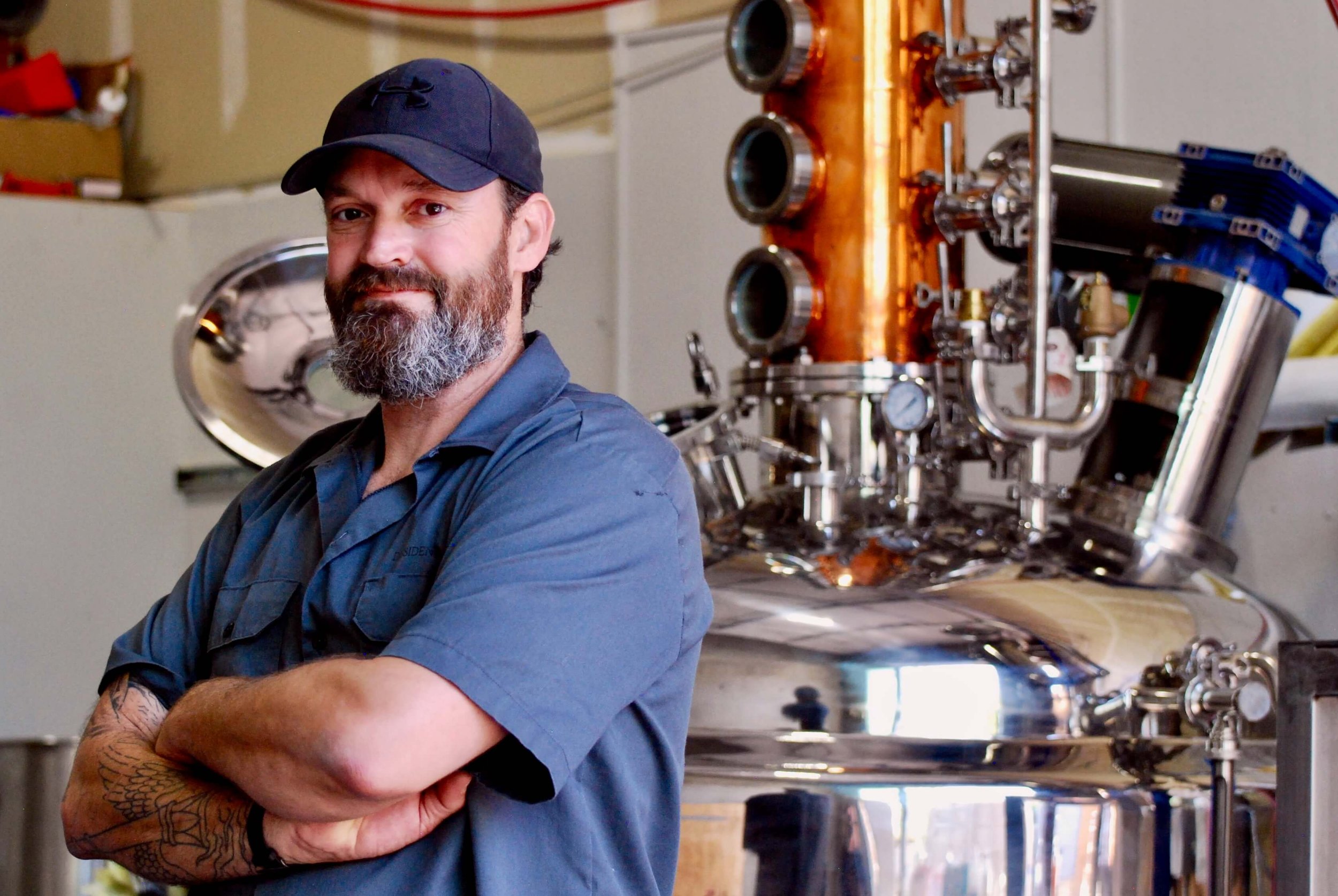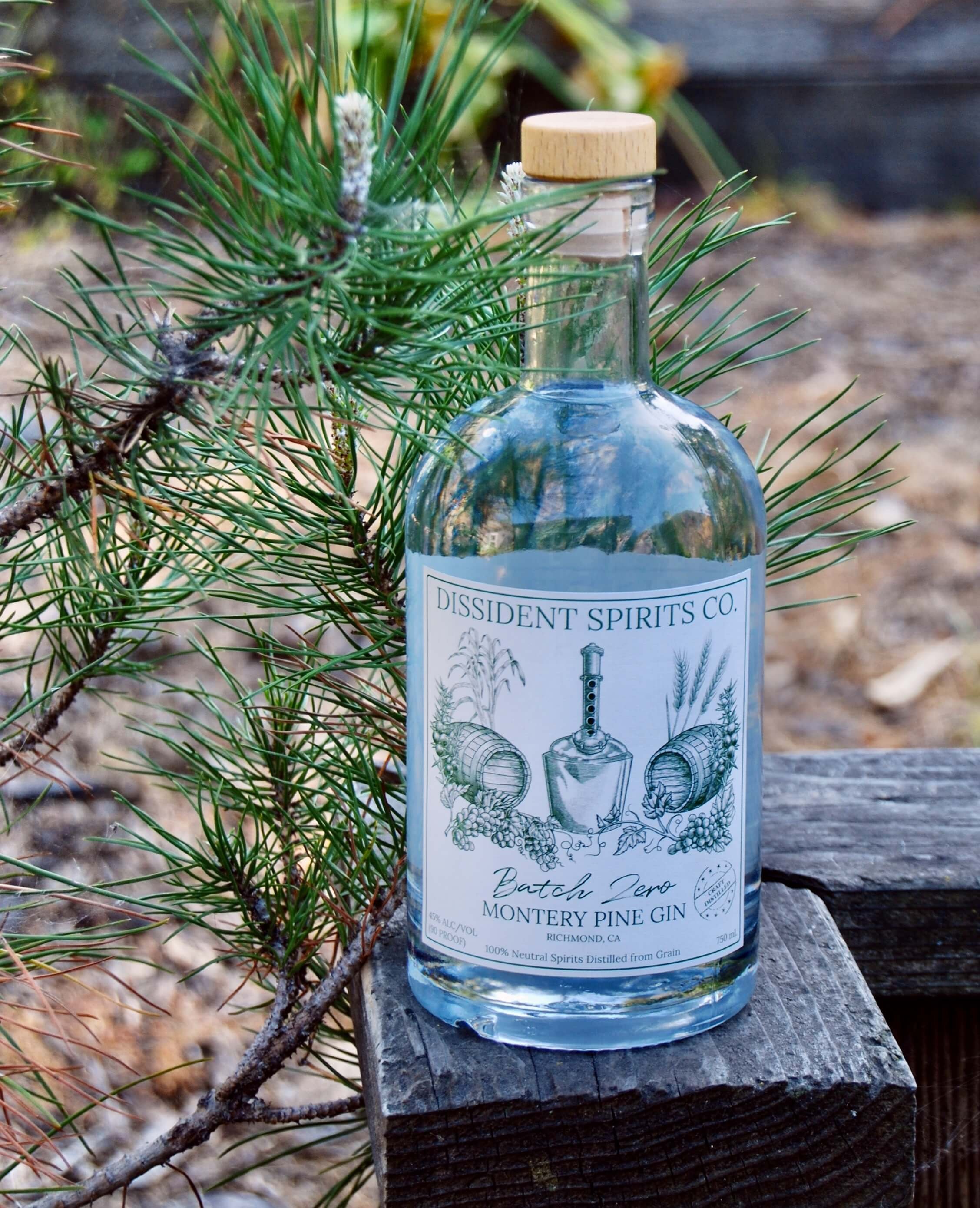How Dissident Spirits Is Taking A Fresh Approach to Gin
Adrian Wiley head distiller photo courtesy Dissident Spirits
On the day Dissident Spirits officially opened to the public in 2021, founders Adrian Willey and Oliver Gothe had low expectations. The pandemic had limited the traffic at retailers of all sorts; the partners had bootstrapped their operation—including a one-of-a-kind Willey-designed still—for a small fraction of what a new distillery should theoretically cost to get rolling; and they’d done nothing in terms of marketing or publicity yet.
But true to its contrary moniker, doing things differently worked out just fine for Dissident.
“Our first gin was ready to bottle, and we were here with some friends who were helping out,” recalls Willey at Dissident HQ, a small, not-so-easy-to-find facility in a Richmond, California office park. “We figured, well, we’re around all day, why don’t we just throw it out on social media.”
“We didn’t have our tasting room set up at all yet. Someone brought in a long section of bartop and we just set it on a couple of 55 gallon drums. Five minutes after we announced that we were going to open, people started dropping in. We ended up literally calling out orders as gin was being bottled and labelled.
While Dissident is still barely two-years in business, its flagship Monterey Pine Gin is already an award-winner. In addition to Monterey Pine, Dissident’s Peppercorn Gin, Marina Bay Vodka and Collina Ricca Amaro are now available for purchase online through Blackwell’s Wines & Spirits and in person at their now-thriving tasting room, where lucky visitors can also purchase limited run developmental experiments including a rare U.S.-made sloe gin, unique rums, and a peated gin that may ultimately find their way to a larger marketplace.
In the meanwhile, a steady stream of spirits aficionados has been making its way to meet Dissident’s mad scientists and hear their stories at their Bay Area laboratory.
Grain to Grape to Grain
“I started making beer when I was sixteen,” says Adrian Willey. “Pretty much as soon as I learned that I couldn’t buy beer!”
“Ironically, I could buy all the ingredients that go into beer and brew my own. So that’s how I got going, brewing up some horrifyingly bad beer as a high school kid. Gradually, I became more interested and more serious in brewing and kept it up as a hobby through college and into my adult life.”
Gothe, a homebrewer as well, was also an accomplished amateur winemaker when he met Willey at Oak Barrel Winecraft in Berkeley, a hobbyist nirvana for oenophiles. As the fast friends collaborated on wine projects, they began to fantasize about opening their own distillery.
Both grain and grape are retained in the base that Dissident uses for both its gins and vodka: An unusual corn and wine formula yields a smooth, rounded mouthfeel and ever-so-slight brandy sweetness.
Drawn to Complexity
Gothe is a high-level data analyst at Facebook whose first career was as a physical chemist. Willey is a practicing psychologist with a lifelong passion for engineering.
“My father and I used to rebuild antique sports cars, the weirder, the better,” Willey recalls. “Then I got into rally and rallycross cars; building them and taking them out to a dirt track to have some fun. Eventually, I felt like I was getting a little too old to be doing things that reckless.”
“To apply the skills I used in rehabbing cars, I started making distillery equipment, working with a fabricator in Oakland. I would come up with the designs and we’d go back and forth, improving them. At first it was hobby level stuff for very small-scale customers, but eventually I ended up making professional size distilling equipment.”
“I’m finding more and more people with academic backgrounds moving into distilling,” Willey says. “There’s a lot of science to it.”
Obsessed with Process
Dissident Spirits products photo courtesy Dissident Spirits
“There tends to be a lot of discussion about the mix of botanicals in differentiating gins,” says Willey. “But what we choose to focus on most is the mouthfeel and smoothness.”
“You can take a variety of gins and rank them according to how harsh they are on the front of the palate, when the spirit first hits your mouth; or on the back of the palate, where it gets up into your nasal cavity. Those are two distinctively different sources of harshness—and they can both be controlled to a degree through the distilling process.”
“I wouldn't go so far to refer to our still as scientific equipment, that level of precision isn't there. But there is a lot of science to the process. We tend to be really conservative with our cuts. There’s always going to be a little bit of the heads that gets through to the hearts, but the amount can be cut down. We take a lot of care and spend about an extra hour on our heads cuts. Similarly with our tails cuts, we’d rather just save more tails and redistill them the next time than take any kind of chance that the quality of the gin gets affected.
“We tend to make our cuts by taste and smell. Which is not unusual. But I think that our willingness to say that something just isn’t exactly right and scrap it is a big part of what makes us different.”
“Another key to our process is that throughout the hearts, we carefully keep the proof controlled—every part of the hearts should be within one proof of our target [90 proof for Dissident’s gins]. That really impacts mouthfeel and smoothness.”
A Fresh Take
Dissident Spirits Pepper gin photo credit Nora Fleming
While Dissident isn’t focused on showcasing exotic botanicals, the manner in which they handle ingredients is another crucial aspect of the distilling process.
“Both of our gins incorporate citrus,” says Willey. “But the citrus peel is the last thing that we prepare. I do not like even having it sitting out for five minutes before it goes in the gin basket. I want all of that fresh citrus in there. We never use dry ingredients when we can avoid it. Our rosemary is always fresh. I pick it on the day of distilling from the bush in my yard.”
Dissident uses some botanicals for purposes other than flavor.
“A little bit of honey, I’m talking 50cc’s in a 250 gallon batch, is enough to soften the mouthfeel, giving it a silkiness without imparting much in the way of flavor. Orris root is another thing we use not for flavor, but for feel.”
While they may be named Dissident, they have every intention of being part of their community and hope to offer opportunities to engage, including hosting local artists, events and contests on social media. Sign up for limited release announcements.




